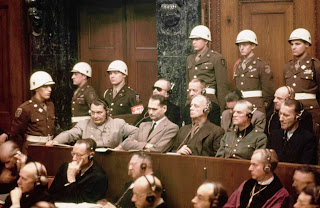Post No. 37: Nuremberg trials.
The Nuremberg trials were a series of military tribunals
held by the Allied forces under international law and the laws after World War
II. The trials were most notable for the prosecution of prominent members of
the political, military, judicial and economic leadership of Nazi Germany, who
planned, carried out, or otherwise participated in the Holocaust and other war
crimes. The trials were held in the city of Nuremberg, Germany, and their
decisions marked a turning point between classical and contemporary
international law. They were held between 20 November 1945 and 1 October 1946.
They used some terms as “crimes against humanity”.
This term “crimes against humanity” was first used by George
Washington Williams in a pamphlet published in 1890 to describe the practices
of Leopold II of Belgium’s administration of the Congo Free State.
The Article 6 of the London Charter of the International
Military Tribunal was the decree that set down the laws and procedures by which
the post-War Nuremberg trials were to be conducted.
This article is defined as:
“Murder, extermination, enslavement, deportation, and other
inhumane acts committed against any civilian population, before or during the
war, or persecutions on political, racial or religious grounds in execution of
or in connection with any crime within the jurisdiction of the Tribunal,
whether or not in violation of the domestic law of the country where
perpetrated.”




Comments
Post a Comment